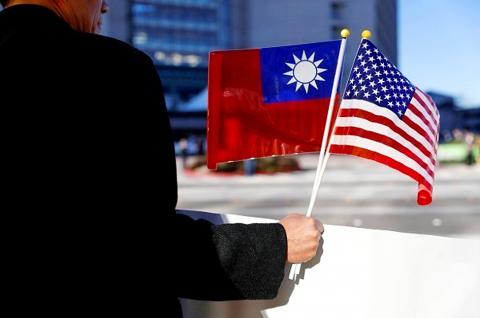The US House of Representatives on Tuesday passed the Taiwan Assurance Act of 2019 and House Resolution 273 reaffirming the US’ commitment to Taiwan and the implementation of the Taiwan Relations Act (TRA).
The Taiwan Assurance Act was passed without objection, while the resolution was carried in a vote of 414 votes in favor, zero against and 17 abstentions.
“It is the sense of [the US] Congress that Taiwan is a vital part of the United States free and open Indo-Pacific strategy,” the Taiwan Assurance Act reads.

Photo: Reuters
The US should “conduct regular sales and transfers of defense articles to Taiwan in order to enhance its self-defense capabilities, particularly its efforts to develop and integrate asymmetric capabilities, including undersea warfare and defense capabilities, into its military forces,” it says.
In the fourth section on “Taiwan’s Inclusion in International Organizations,” the Taiwan Assurance Act says that it is US policy to advocate for the nation’s “meaningful participation” in international bodies “as appropriate,” giving as examples the UN, the World Health Assembly, the International Civil Aviation Organization and the International Criminal Police Organization, commonly known as Interpol.
It is also US policy to advocate for Taiwan’s membership in the Food and Agriculture Organization, UNESCO and “other international organizations for which statehood is not a requirement for membership,” it says.
It requires the US secretary of state to review the US Department of State’s guidance governing relations with Taiwan, including its “Guidelines on Relations with Taiwan” and other documents, and to reissue the guidance to the US government’s executive branch departments and agencies within 180 days of enactment.
Meanwhile, the resolution says that the TRA and the “six assurances” have been “essential components in helping to maintain peace, security and stability in the Western Pacific,” and are “cornerstones” of US policy toward Taiwan.
The House encourages mutual visits between US and Taiwanese officials, per the Taiwan Travel Act that was signed into law in March last year, the resolution says.
It also reiterates that the US president should conduct “regular transfers of defense articles to Taiwan consistent with Taiwan’s national security requirements in accordance to prior legislation.”
It calls on the secretary of state to “actively engage internationally in support of Taiwan’s meaningful participation in international organizations engaged in addressing transnational threats and challenges,” and recognizes Taiwan’s “partnership in combating global terrorism.”
In Taipei yesterday, Presidential Office spokesman Xavier Chang (張惇涵) thanked the House for its support, saying that the passage of the resolution is especially important on the 40th anniversary of the TRA.
Calling the US Taiwan’s “most important partner in the international community,” Chang said that the government’s efforts over the past three years have allowed it to be seen as a reliable partner in maintaining the “status quo” of regional peace and stability.
Taiwan’s strategic importance is no longer restricted to the Taiwan Strait, but now includes the Pacific, he said.
Taiwan would continue to play a role in maintaining the “status quo” of regional peace and stability with its partners, he added.

CHAOS: Iranians took to the streets playing celebratory music after reports of Khamenei’s death on Saturday, while mourners also gathered in Tehran yesterday Iranian Supreme Leader Ayatollah Ali Khamenei was killed in a major attack on Iran launched by Israel and the US, throwing the future of the Islamic republic into doubt and raising the risk of regional instability. Iranian state television and the state-run IRNA news agency announced the 86-year-old’s death early yesterday. US President Donald Trump said it gave Iranians their “greatest chance” to “take back” their country. The announcements came after a joint US and Israeli aerial bombardment that targeted Iranian military and governmental sites. Trump said the “heavy and pinpoint bombing” would continue through the week or as long

TRUST: The KMT said it respected the US’ timing and considerations, and hoped it would continue to honor its commitments to helping Taiwan bolster its defenses and deterrence US President Donald Trump is delaying a multibillion-dollar arms sale to Taiwan to ensure his visit to Beijing is successful, a New York Times report said. The weapons sales package has stalled in the US Department of State, the report said, citing US officials it did not identify. The White House has told agencies not to push forward ahead of Trump’s meeting with Chinese President Xi Jinping (習近平), it said. The two last month held a phone call to discuss trade and geopolitical flashpoints ahead of the summit. Xi raised the Taiwan issue and urged the US to handle arms sales to

State-run CPC Corp, Taiwan (CPC, 台灣中油) yesterday said that it had confirmed on Saturday night with its liquefied natural gas (LNG) and crude oil suppliers that shipments are proceeding as scheduled and that domestic supplies remain unaffected. The CPC yesterday announced the gasoline and diesel prices will rise by NT$0.2 and NT$0.4 per liter, respectively, starting Monday, citing Middle East tensions and blizzards in the eastern United States. CPC also iterated it has been reducing the proportion of crude oil imports from the Middle East and diversifying its supply sources in the past few years in response to geopolitical risks, expanding

Pro-democracy media tycoon Jimmy Lai’s (黎智英) fraud conviction and prison sentence were yesterday overturned by a Hong Kong court, in a surprise legal decision that comes soon after Lai was jailed for 20 years on a separate national security charge. Judges Jeremy Poon (潘兆初), Anthea Pang (彭寶琴) and Derek Pang (彭偉昌) said in the judgement that they allowed the appeal from Lai, and another defendant in the case, to proceed, as a lower court judge had “erred.” “The Court of Appeal gave them leave to appeal against their conviction, allowed their appeals, quashed the convictions and set aside the sentences,” the judges